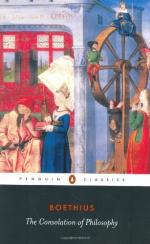
|
| Name: _________________________ | Period: ___________________ |
This test consists of 15 multiple choice questions and 5 short answer questions.
Multiple Choice Questions
1. Where does Boethius usually study before going to prison?
(a) His library.
(b) In his pool.
(c) The bath house.
(d) His living room.
2. What does the woman disagree with Boethius about in Book 1?
(a) That the earth is flat.
(b) That he can't escape from prison.
(c) That God is all powerful.
(d) That the affairs of men are beyond Divine Providence.
3. Why does Boethius not understand what the woman is trying to explain to him in Book 1?
(a) His suffering seems quite real.
(b) He is malnourished.
(c) He has a limited intellect.
(d) The woman does not speak his language.
4. Who is the woman in the cell with Boethius?
(a) Science.
(b) Fortune.
(c) Philosophy.
(d) Vengeance.
5. How is Boethius feeling after the woman's speech about the ups and downs of Fortune?
(a) Angry.
(b) Happy.
(c) Sleepy.
(d) Confused.
6. Why is Boethius in jail?
(a) He is visiting a friend there.
(b) He committed murder.
(c) He awaits death.
(d) He stole a horse.
7. What does Philosophy tell Boethius after giving her example of happiness?
(a) He should focus on revenge.
(b) He should focus on his family.
(c) He should work on his book.
(d) He should focus on the good in his life.
8. How tall is the woman that appears in Boethius' cell?
(a) Very small, her head could not reach the table.
(b) Tall, her head could penetrate the heavens.
(c) Small, she could look Boethius in the eyes.
(d) Medium size, her arms could touch the ceiling.
9. Why does the woman tell Boethius that he is responsible for his situation?
(a) Because he didn't became Emperor when he had the chance.
(b) Because he always ran from his responsibilities.
(c) Because a philosopher does not need books or libraries to be a philosopher.
(d) Because he had too much money.
10. What protects Boethius from his persecutors according to the woman?
(a) The Canon of justice.
(b) The trumpets of Jericho.
(c) The sword of incompetence.
(d) The fortress of Philosophy.
11. What does Philosophy think Boethius feels about fortune?
(a) That philosophy is a good friend.
(b) That fortune is a good companion.
(c) That fortune did the right thing.
(d) That fortune changed her attitude toward him
12. According to Philosophy, what are the remarks Philosophy makes about Fortune at the beginning of the Book II?
(a) Only an introduction to her main argument.
(b) Only a small part of her great wisdom.
(c) Everything Boethius needs to feel better.
(d) Everything she has to say.
13. Why does Boethius want political power?
(a) To be safe from persecution.
(b) For personal gain.
(c) To help friends get jobs.
(d) To promote justice.
14. Why does Philosophy say that material possessions are relatively insignificant?
(a) Because only God can give happiness.
(b) Because the body perishes.
(c) Because of taxation.
(d) Because they can be taken away by enemies.
15. What did philosophy compel Boethius to always do?
(a) Talk too much.
(b) Stand up for the truth.
(c) Spend time thinking.
(d) Run from a fight.
Short Answer Questions
1. Why does Philosophy praise Boethius' sons?
2. What does Philosophy tell Boethius about his situation?
3. What is the highest possible good according to Philosophy?
4. What type of man is unmoved by what happens to him, good or bad?
5. What should Boethius keep in mind concerning his money?
|
This section contains 588 words (approx. 2 pages at 300 words per page) |

|




